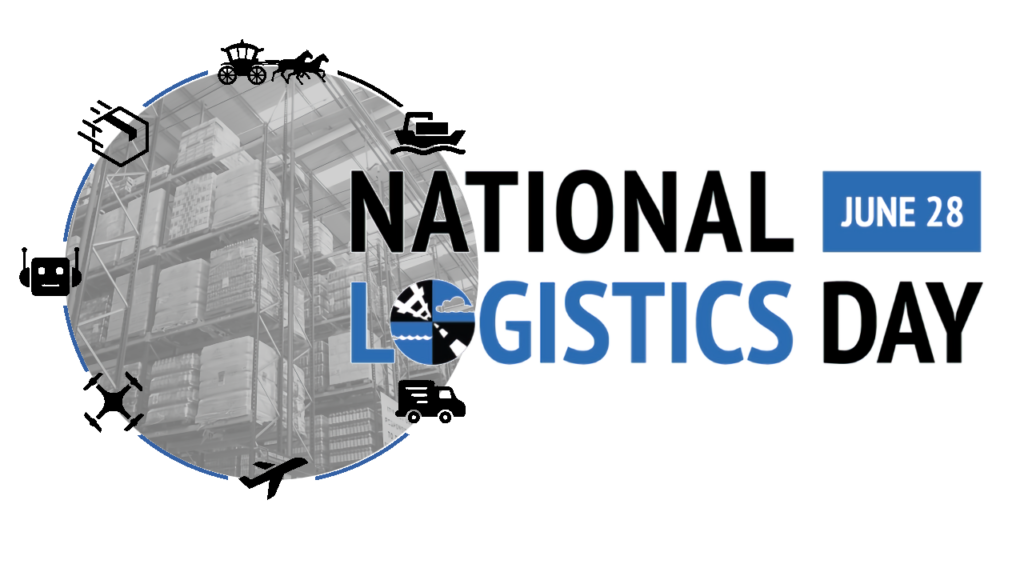By land, air, and sea, people and goods move around the planet. Humans, by their very nature, desire to connect and to trade with other humans. Admittedly, the term “trade” has often meant to exploit; nevertheless; most people understand that logistics is what makes the world go round. The staff at Mecalux explains, “Logistics has played a crucial role in the development of humanity throughout history. From the origin of logistics — with the first efforts made to transport goods and supplies — to today’s most complex management and distribution systems, logistics has become a pillar of the business world. Every stage in the history of logistics has been marked by technological advances and changes in transport, storage, and management methods. The goal? To improve efficiency and the flow of goods and services.”[1] Annually, June 28th is set aside to honor all the men and women involved in the logistics sector — and there are a lot of them to honor. Melanie Hinton, Vice President of Marketing & Communications at the Transportation Intermediaries Association (TIA), reports, “According to the Bureau of Labor & Statistics, the Transportation & Warehouse sector employs 6.6 million people. To put that in context, we employ more people than the population of Denmark, which only has 5.8 million residents.”[2] That number doubles to over 13 million people when everyone associated with logistics is included.
National Logistics Day was established in 2019 when Logistics Plus partnered with the Registrar at National Day Calendar to create an annual day to recognize and appreciate the importance of the logistics industry in both the U.S. economy and the global economy. The timing couldn’t have been better. The following year the world suffered through the COVID-19 pandemic and a bright light was directed towards the logistics industry. The Logistics Plus staff notes, “COVID-19 placed a spotlight on America’s logistical heroes — drivers, warehouse personnel, logistics specialists, and countless others — [who continued] to source, distribute, and deliver critical food, medical products, and personal protective equipment across [the] country [during] this time of need.” The following video from Logistics Plus will help you appreciate why National Logistics Day deserves to be celebrated.
Although it should be obvious why logistics are important for all of us, the staff at Holiday Calendar spells out three of the greatest benefits provided by logistics.[3] They are:
1. Logistics helps to ensure effective, efficient and timely delivery of goods. “Without logistics, it would be very difficult for businesses to transport products to their customers in a timely manner. A well-planned logistics system ensures that goods can be delivered safely and reliably, on time, and with minimal cost — preventing any major delays or missed deadlines.”
2. Logistics can helps reduce costs. “Logistics can help businesses save money by providing them with the tools to optimize their supply chains. By having more efficient delivery routes, warehouses, and inventory systems in place, companies can reduce their operational costs while still delivering great customer service.”
3. Logistics help to create value. “By leveraging supply chain technology and data analytics, businesses are able to identify areas of improvement and create added value — resulting in higher profits. Logistics also creates jobs in the transportation industry, helping to stimulate economic growth.”
Many of the articles about logistics trace its beginning to the days of Marco Polo. For example, the staff at National Day Calendar writes, “The logistics industry first started to take form when Marco Polo traveled to China on the Silk Road. His detailed written record paved the way for future traders and merchants traveling between Europe and China. In 1896, the invention of the ‘horseless carriage’ semi-truck improved how goods moved across our country. Just 14 years later, the first air cargo flight took place in 1910. The flight between Dayton and Columbus dramatically increased the speed with which goods could be delivered in the U.S. By 1956, the first container ship sailed from the port of New Jersey to Texas. Shipments forever changed how goods moved around the world. These advancements demonstrate how logistics connect the world — and always have.”[4] The phrase “and always have” recognizes the fact that the movement of goods can be traced back to prehistorical times.
Through the ages, humans have worked tirelessly to improve logistics systems. Those efforts are still ongoing. The Mecalux staff notes, “[In the] 20th century, logistics became a more formal area of study and research. Mass production, globalization and the adoption of technologies such as the telephone, radio and later, the internet, transformed logistics management. Methods such as just-in-time and supply chain management were introduced.” With the arrival of the so-called “Digital Era,” more advancements were made. The Mecalux staff explains, “With the advancement of digital technology and the advent of the information age, logistics underwent radical changes. Warehouse and transport management software, barcodes, RFID technology and real-time traceability and tracking systems were developed.” The Digital Era introduced a phase of logistics that the Mecalux staff calls “Logistics 4.0.” They write, “Modern logistics, i.e., Logistics 4.0, is based on digitalization, artificial intelligence (AI), the Internet of Things (IoT) and robotic process automation (RPA). Route optimization, the use of autonomous vehicles and the implementation of automated warehouses are examples of this new technological era.” They predict we are quickly heading into the next phase: Logistics 5.0. They write, “Following the emergence of Industry 5.0, a term coined by the European Commission, the logistics industry seeks to promote additional values vital to its future. These include human well-being, sustainability and resilience. It also fosters the strengthening of resilience strategies to shore up the sector against sudden supply chain disruptions such as those resulting from the coronavirus pandemic.”
One thing of which I’m certain: Logistics professionals will never stop trying to improve how people and goods move around the globe. And artificial intelligence is likely to play a major role in any future improvements. Supply chain journalist Robert J. Bowman predicts, “AI, and GenAI specifically, will eventually come to play an indispensable role in logistics and other industries. [The Boston Consulting Group] believes GenAI will make it possible for organizations to ‘increase productivity, enhance efficiency and effectiveness, boost revenue, and build a long-term competitive advantage.’ It’s just a question of when.”[5] Take the time to wave at a truck driver, shake a delivery person’s hand, or give a pat on the back to anyone associated with the logistics sector. They deserve our thanks, especially on National Logistics Day.
Footnotes
[1] Staff, “Logistics history: origin and development,” Mecalux Blog, 1 August 2023.
[2] Melanie Hinton, “Celebrating the Industry on National Logistics Day,” 3PL Perspectives, 1 June 2024.
[3] Staff, “National Logistics Day,” Holiday Calendar.
[4] Staff, “Media Alert | New Day Proclamation | National Logistics Day – June 28,” National Day Calendar.
[5] Robert J. Bowman, “The Role of AI in Logistics: Getting Beyond Hope and Hype,” SupplyChainBrain, 13 May 2024.





